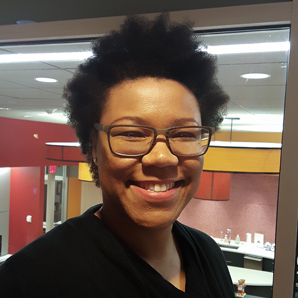Alumna
Why did you choose graduate school at IUPUI?
IUPUI has afforded me tremendous opportunities to learn, to deeply listen, and to lead via the rich experiences and guidance of the University’s faculty and staff. Through these experiences, encouragement to persist in degree attainment became an expectation and a true honor.
What has been your favorite academic accomplishment since you’ve been here?
I have been fortunate to receive such awards as Junior Achievement's Indy's Best & Brightest Award in the division of Education & Not for Profit; IUPUI’s Graduate and Student Professional Government’s Elite 50 Award and Best in School; IU School of Education – Indianapolis Award, the Center for Leadership Development's Distinguished Achievement Award; the Peter Bassett Barlow Award, Indiana University Alumni Magazine's Top 30; and NCAA Indiana Woman of the Year.
What do you enjoy most about life in Indianapolis?
I enjoy the people, places, and conversations always at play against the backdrop of an every-changing, bustling city.
Please provide some details about your work/research as a graduate student and/or any activities you are involved in.
My work and ideas around creative problem solving in education policy, education leadership, and education reform have been accepted by Design-Ed, the Indiana Urban Schools Association, International Conference on Urban Education, the Design Management Institute, the Academy for Educational Studies, and the Journal of Curriculum Theory. My research is focused on policy implementation in urban school communities—how individuals interact around and through policy; further, how interactions converge and impact neighbors, educators, parents/caregivers, and students. Specifically, I explore the ecologies (Weaver-Hightower, 2008) between city and school with particular concentrations in three areas: 1) how marginalized students and groups of students are represented and framed by dominant narratives (Harry, Rueda, & Kalyanpur, 1999) in policy implementation, 2) community stakeholders’ learning via transformative professional learning (Macey & Radd, 2013) towards equity, and 3) critical collaborative problem solving. My first research concentration centers the inquiry of how social, historic, and economic factors of cities and neighborhoods shape the ways in which federal, state, and local policies are enacted. My second research concentration focuses on community stakeholders’ learning for equity, particularly centering the socio-historic and socio-economic legacies surfaced in my initial concentration. I am interested in how all members of a community can access spaces and opportunities of learning and leading for equity that assist in: 1) critical self-reflection and 2) authentic approaches and interactions of collaboration. Finally, my third research concentration is focused on how people and groups of people can move collaboratively, while possessing a critical lens, in partnerships with organizations and institutions toward redressing inequitable practices in policy creation and implementation (Sutton & Levinson, 2001; Kozleski & Thorius, 2013).
Sutton, M., & Levinson, B. A. (2001). Policy as practice: Toward a comparative sociocultural analysis of educational policy (Vol. 1). Greenwood Publishing Group.
Kozleski, E. B., & Thorius, K. K. (Eds.). (2013). Ability, equity, and culture: Sustaining inclusive urban education reform. Teachers College Press.
Weaver-Hightower, M. B. (2008). An ecology metaphor for educational policy analysis: A call to complexity. Educational researcher, 37(3), 153-167.
Harry, B., Rueda, R., & Kalyanpur, M. (1999). Cultural reciprocity in sociocultural perspective: Adapting the normalization principle for family collaboration. Exceptional Children, 66(1), 123136.
Macey, E.M., Radd, S. (2013). Developing critical consciousness through professional learning. Equity by Design. The Great Lakes Equity Center. Indianapolis, IN.


